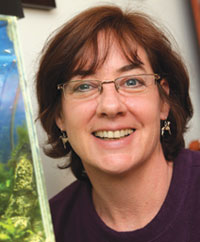Observation
2011-2012 James McKeen Cattell Fund Fellowships Recipients
We are pleased to announce the 2011-2012 recipients of the James McKeen Cattell Fund Fellowships. The Fellowships are awarded yearly to North American university faculty committed to developing scientific research in psychology and its applications to improving human welfare. The award includes financial support that allows recipients to extend their sabbatical period.

Patrick Davies
Patrick Davies, University of Rochester, examines the effects of interpersonal stressors, especially family stressors, on children’s socioemotional adapation and maladapation. His research is guided by the emotional security theory which explains that family and other interpersonal stressors increase children’s risk for psychological maladjustment by undermining their goal of preserving their emotional security. “The extended leave supported by the Cattell Award will allow me expand my focus on understanding how and why discord in close interpersonal relationships poses a risk for children’s mental health,” said Davies. “It will specifically grant me time to distinguish between different patterns of children’s responses to family conflict, chart stability and change in their reactivity over time, and identify the family precursors and mental health implications of their patterns of responding.”

Craig Enders
In his research, Craig Enders, Arizona State University, looks at methodological issues related to analysis with missing data and multilevel modeling. “Most of my recent research has to do with analytic problems that arise with missing data. I recently began working on imputation procedures for multilevel data structures,” says Enders. While missing data handling techniques have advanced in recent years, few studies have focused on multilevel data. “My sabbatical research will focus on missing data handling methods for multilevel data structures. Receiving the James McKeen Cattell Fund Fellowship is a tremendous help because the scope of the problem is very large.”

Pamela Hunt
APS Fellow Pamela Hunt, College of Williams & Mary, has focused her research on how the expression of learning changes during development and how learning can be impacted by prenatal exposure to alcohol. She will use the Cattell sabbatical award to further her research on the latter. She plans to visit Robert Gerlai’s Behaviour Genetics Laboratory at the University of Toronto-Mississauga to learn how to work with zebrafish and use his zebrafish model of early alcohol exposure. She will bring her new knowledge back to William & Mary and establish the zebrafish model in her own lab. Hunt says “I feel like a post-doc again. It’ll be quite a change from what I’ve been doing for the past 25 years, and I am so excited to be learning new things. Using the zebrafish will open up new possibilities for research, and I am grateful to the Cattell Fund for supporting this exciting new direction.”
The James McKeen Cattell Fund was established in 1942 to provide support for the science and application of psychology. Cattell created the fund to support scientific research that would advance the development of psychological science and its applications. For more information about this award visit http://www.psychologicalscience.org/index.php/members/awards-and-honors/cattell-award/.





APS regularly opens certain online articles for discussion on our website. Effective February 2021, you must be a logged-in APS member to post comments. By posting a comment, you agree to our Community Guidelines and the display of your profile information, including your name and affiliation. Any opinions, findings, conclusions, or recommendations present in article comments are those of the writers and do not necessarily reflect the views of APS or the article’s author. For more information, please see our Community Guidelines.
Please login with your APS account to comment.